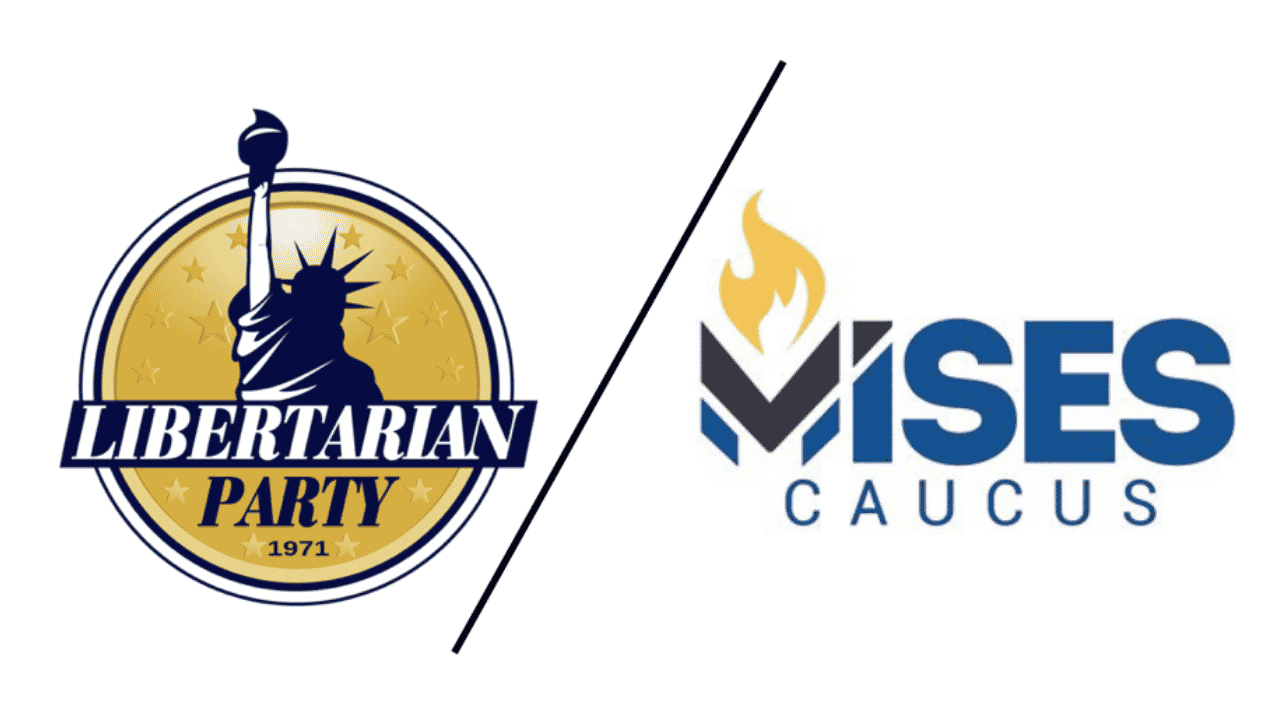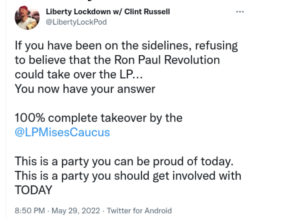This last weekend, the Mises Caucus, a coalition within the Libertarian Party, was elected to all national positions within the party.
For some, Mises control caused consternation:
Aaron Ross Powell is a research fellow at the Cato Institute, a premier libertarian think tank.
For others, jubilation:
Clint Russell is a podcaster that grew his audience to 3.5 times Powell’s in a little over a year, primarily via anti-lockdown/COVID content.
This article will explore the underlying dynamics of why this has happened and where the Libertarian Party can go from here.
The Two Types of Libertarian
Let’s look at two archetypes of a Libertarian. But before we do that, a quick aside on ethics and cognition.
Some Libertarians believe that it is rationality that caused them to adopt their beliefs. My view is that while logic may have played a role, the evidence is strong that humans have rather innate ethical intuitions, and mostly use reason to justify them. Occasionally, reason can be used to overrule our intuitions, but this is difficult and rare. For a longer exposition on this idea, explore the work of Jonathan Haidt. For a succinct example, consider how great everyone thinks their arguments on abortion are and how rarely they actually change anyone’s mind.
A compassionate Libertarian holds an ethical impulse oriented towards equality, egalitarianism, and tolerance. They were attracted to Libertarian philosophy because free markets really do make everyone better off. They are big on immigration because they see many people worse-off that could have a much better life in America. They are nearly universally socially progressive and place primacy on social issues like sex work and LGBTQ rights because they see these as minority groups that are suffering injustice or harm. This archetype opposed the Mises Caucus.
An individualistic Libertarian holds an ethical impulse towards personal freedom and against authority. They were attracted to Libertarian philosophy because they find the state deontologically evil in how it exerts itself. They cared a lot about mask mandates because the idea of state violence being used to stop something as basic as seeing each other’s faces felt viscerally wrong. They love free markets, but care more about free markets because of how they will personally benefit. They may or may not be socially progressive, but even the progressive ones are unlikely to place primacy on social issues. This archetype supported the Mises Caucus.
The quintessential compassionate Libertarian is an economist that likes to talk about how open borders would triple American GDP. The quintessential individualistic Libertarian is a small-scale entrepreneur or trade-worker that likes to chant “end the Fed.”
These are not exclusive categories; any given Libertarian may be 20% of one group and 80% of the other. Either way, compassionate Libertarians used to control the Libertarian Party, but individualistic ones took it over.
The Cause of the Divide
Of the Republicans, Democrats, and Libertarians, the Libertarians are the most likely ones to believe that politics is about policy. This belief is humorous because despite the divide between the two sides getting so heated, there aren’t that many policy matters the two groups actually disagree on! Both groups want to end every war, substantially cut taxes, have unfettered trade, end the drug war, etc.
While there are some matters of policy disagreement, the actual cause of the divide is about what is emphasized by the Party and how that will be perceived by others, particularly others close to them.
Compassionate Libertarians are more likely to be found working white-collar jobs in larger companies. When the Party says something that many people disagree with, they get concerned about how they will be judged by the people that know they are a Libertarian. So compassionate Libertarians tend not to like messages like this one:
Individualistic Libertarians were less likely to have a problem with this, either because they have a disposition that is more tolerant to saying things that are true but unpopular, or because they have a life position where they are less affected. On the other hand, individualistic Libertarians tend to not like messages like this one.
Individualistic Libertarians disliked this tweet because they saw it as pandering, ineffective, and unrepresentative of what Libertarians believe. Compassionate Libertarians liked this tweet, because they saw it as making their political philosophy more socially acceptable.
Finally, one repeated criticism I’ve seen of the Mises camp is that they just want to be edgy, but I think this is false. They may be slightly more edgy for the reasons described above, but what is edgy is just as much driven by the milieu of each camp.
Where Libertarians Can Go
Many people in both camps of Libertarians feel that the other camp can’t be worked with. I’d like us to try to be exceptional and use our logic to overwhelm that impulse. Political parties succeed when they allow different coalitions to work together to achieve success.
My strongest request is that both camps recognize that there are people with vastly different personalities and dispositions that want similar political changes. If we can’t work with people so close to us on actual policy preferences, we have no hope of ever achieving them.
For the individualist libertarians, my requests are:
- Be humble in your victory and attempt to rebuild relationships that may have been damaged over the last year. You are the victor, it’s your job to be magnanimous.
- Appreciate that even the libertarians you regard as blue-pilled or soft are on your side and are frequently doing strong intellectual work that backs up the ideas you know are true.
- Accept and encourage the inclusion of at least some messaging appeals to the other camp. Even if you regard it as cringe and definitely not based.
- Work as hard as you can to make the Libertarian Party larger and more effective than it ever has been. Otherwise, you will be regarded as failures.
For the compassionate libertarians, my requests are:
- Accept that your loss happened. At least give the new group in control a chance to succeed before publicly attacking.
- Appreciate that even the libertarians who you may regard as crude, conspiratorial, or insensitive mostly want the same things you do. And that there are a lot of these people.
- Accept that there may be messaging from the new party that you don’t love. Focus on amplifying the messaging you do agree with. Attempt to show the messaging you prefer works better and complain privately if you’re not getting it.
- Assuming you meet request one, do not leave the Party. Work to recruit more people who agree with you or to convert those in the Party to your camp, because it’s important both camps are represented.
There’s no force on earth that can stop an idea whose time has come, except for ourselves.











